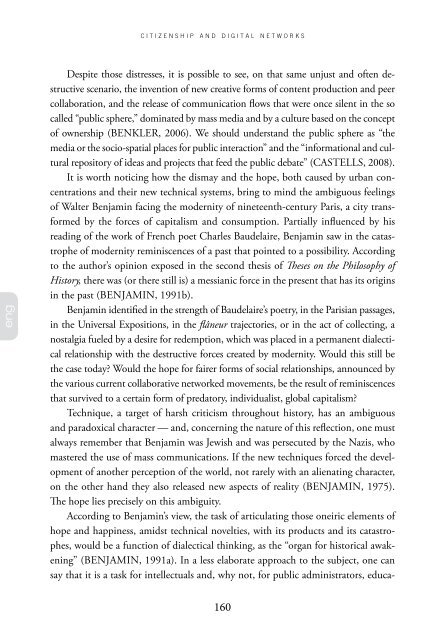Sergio Amadeu da Silveira - Cidadania e Redes Digitais
Sergio Amadeu da Silveira - Cidadania e Redes Digitais
Sergio Amadeu da Silveira - Cidadania e Redes Digitais
You also want an ePaper? Increase the reach of your titles
YUMPU automatically turns print PDFs into web optimized ePapers that Google loves.
eng<br />
c i t i z e n s h i p a n d d i g i t a l n e t w o r k s<br />
Despite those distresses, it is possible to see, on that same unjust and often destructive<br />
scenario, the invention of new creative forms of content production and peer<br />
collaboration, and the release of communication flows that were once silent in the so<br />
called “public sphere,” dominated by mass media and by a culture based on the concept<br />
of ownership (BENKLER, 2006). We should understand the public sphere as “the<br />
media or the socio-spatial places for public interaction” and the “informational and cultural<br />
repository of ideas and projects that feed the public debate” (CASTELLS, 2008).<br />
It is worth noticing how the dismay and the hope, both caused by urban concentrations<br />
and their new technical systems, bring to mind the ambiguous feelings<br />
of Walter Benjamin facing the modernity of nineteenth-century Paris, a city transformed<br />
by the forces of capitalism and consumption. Partially influenced by his<br />
reading of the work of French poet Charles Baudelaire, Benjamin saw in the catastrophe<br />
of modernity reminiscences of a past that pointed to a possibility. According<br />
to the author’s opinion exposed in the second thesis of Theses on the Philosophy of<br />
History, there was (or there still is) a messianic force in the present that has its origins<br />
in the past (BENJAMIN, 1991b).<br />
Benjamin identified in the strength of Baudelaire’s poetry, in the Parisian passages,<br />
in the Universal Expositions, in the flâneur trajectories, or in the act of collecting, a<br />
nostalgia fueled by a desire for redemption, which was placed in a permanent dialectical<br />
relationship with the destructive forces created by modernity. Would this still be<br />
the case to<strong>da</strong>y? Would the hope for fairer forms of social relationships, announced by<br />
the various current collaborative networked movements, be the result of reminiscences<br />
that survived to a certain form of pre<strong>da</strong>tory, individualist, global capitalism?<br />
Technique, a target of harsh criticism throughout history, has an ambiguous<br />
and paradoxical character — and, concerning the nature of this reflection, one must<br />
always remember that Benjamin was Jewish and was persecuted by the Nazis, who<br />
mastered the use of mass communications. If the new techniques forced the development<br />
of another perception of the world, not rarely with an alienating character,<br />
on the other hand they also released new aspects of reality (BENJAMIN, 1975).<br />
The hope lies precisely on this ambiguity.<br />
According to Benjamin’s view, the task of articulating those oneiric elements of<br />
hope and happiness, amidst technical novelties, with its products and its catastrophes,<br />
would be a function of dialectical thinking, as the “organ for historical awakening”<br />
(BENJAMIN, 1991a). In a less elaborate approach to the subject, one can<br />
say that it is a task for intellectuals and, why not, for public administrators, educa-<br />
160


